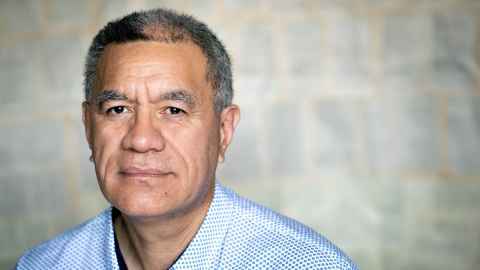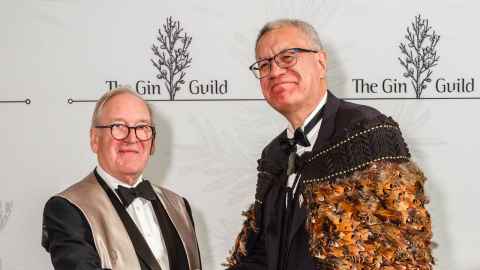Marcel Thompson: spirit guide
4 November 2025
Alumni profile: Working with some of the gin world’s biggest brands straight out of University launched Marcel Thompson into a career steeped in the spirit.

In the late 1980s, fresh out of the University of Auckland, Marcel Thompson was faced with an intriguing choice of career paths: pharmaceuticals, explosives or gin.
“I was fortunate enough to land three job offers at the same time,” recalls Marcel. “The first two sounded very responsible in matters of life and death, and the third sounded like a lot more fun.”
And so, armed with his Bachelor of Science, with a major in chemistry, he began working as an assistant distiller at United Distillers NZ. Thrown in at the deep end from day one, Marcel began learning the trade, working with such renowned brands as Tanqueray, Gordon’s, Booth’s and Boord’s.
“All these years later, I realise just how blessed and fortunate I was to have a role in a gin distillery that was producing some of the biggest brands on the planet,” he says. “At an early stage I also got a very intense exposure to the business process from start to finish, producing a fast-moving consumer good. I learnt a great deal about the importance of teamwork, good communication and what good leadership looks like. And for that I am forever grateful.”
Describing gin making as a “highly sensory experience”, Marcel relished the challenge of learning to balance the intuitive nature of identifying the taste of a great gin with the analytical side of getting the chemistry just right to achieve that desired taste.
“Putting numbers against a feeling – which really does understate the skill my mentors had – was pretty satisfying,” he says.
I realise just how blessed and fortunate I was to have a role in a gin
distillery that was producing some of the biggest brands on the planet.
Although born and raised in Auckland, Marcel (Ngāti Whātua, Waikato, Ngāti Koata) has spent a sizeable chunk of his career working overseas, mainly in Australia, where he moved in the early 1990s, as well as in Fiji and Papua New Guinea. He has also spent time working as a manufacturing consultant over the course of his career, but, as he is quick to point out, “I always had my hand on the tiller in the spirits industry”.
And while the fundamentals of gin making may have remained the same for hundreds of years, the industry itself has changed drastically since Marcel’s time as an assistant distiller in the 1980s. Once dominated by just the large, legacy brands, recent years have seen an explosion of boutique distilleries.
“When I first entered the industry in 1987, it was very closed,” he says. “There was a real sense of confidentiality around it – and the reason being is that if you’re entrusted with brands like Tanqueray, which was created in 1830, and Gordon’s, in the 1760s, there is a real sense of ownership and guardianship to go with that heritage.”
All that changed in 2008, however, when UK laws around gin making were amended. Previously, gin could be legally produced only in stills with a minimum capacity of 1,800 litres. But the new legislation made it much easier for smaller distilleries to meet the necessary licensing requirements to make gin. This opened the door for small-batch distillers to enter the game – led largely by the London-based distillery Sipsmith – and paved the way for a subsequent boom in craft gin production.
Marcel says while the change has led to a more crowded market, today’s gin-making scene is characterised by a greater sense of camaraderie and openness.
“The product now needs to stand out in a more competitive marketplace, but there’s a lot more transparency and support around the industry,” he says. “It’s this whole notion where a rising tide raises all boats.”

And that ethos of sharing knowledge and helping others is a major part of Marcel’s raison d’être. Working with businesses like Poor Toms, which he helped establish in Sydney in 2014, Marcel played a key role in the craft distilling movement in Australia. And in 2018, he founded Still Magic, a spirits business dedicated to partnering with those keen to learn the ins and outs of making and selling gin commercially.
Marcel has also written two best-selling books: Still Magic, “to show people that making great gin is accessible”, and Gin Ventures, “to demonstrate that everyday people can produce fantastic spirits businesses”. He admits to taking a shine to the writing process over the years and has another book up his sleeve, focusing on how to grow a gin business.
Last year, in a career highlight, his commitment to the industry was acknowledged when he became the first New Zealander to be installed as a lifetime member to the prestigious Gin Guild in the UK.
“It was a really remarkable sense of achievement and a moment I’ll treasure for quite some time,” says Marcel, who wore a kākahu made by his cousin Dale King especially for the occasion, honouring his Māori heritage. “In terms of education and promoting spirits for consumption and marketing, to have membership with such an illustrious group is highly satisfying.”
Now, Marcel has a new project on the go in the Waikato, where he lives with his wife, Mary.
The Te Aroha Distilling Co, slated to open later this year, will be a “spirits centre of excellence” that will function as both a gin distillery and an education hub. The plan is to teach everything from the sensory aspects of gin to how to plan, launch and run a spirits business. And, of course, students will also learn the practical skills needed to distil great gin. The centre takes its name from both the town in which it is located and the beautiful Mount Te Aroha, in whose shadow it sits.
“My mentors have often said that the four things you need for great gin are great people, great ingredients, great equipment and love. So, what better place to put a distillery than at the foot of the mountain of love."
– James Fyfe
This article first appeared in the Spring 2025 issue of Ingenio.